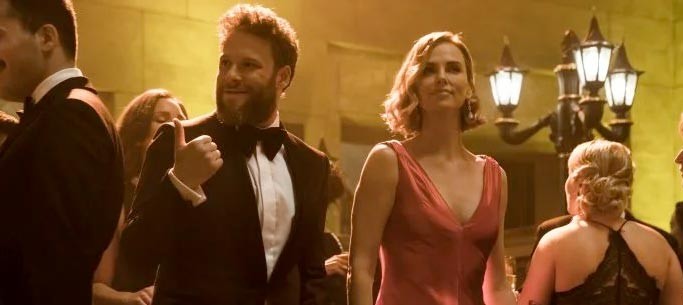
Seth Rogan and Charlize Theron in Long Shot
Long Shot is a new film starring Seth Rogan and Charlize Ther…
ALL HAIL IMPERATOR FURIOSA, WARRIOR OF THE WASTELAND, CONQUERER OF THE CITADEL!
I’m sorry. That happens sometimes when I try to talk about Charlize Theron. She is one of our greatest living screen actors, with dozens of film credits and an Academy Award she earned for playing serial killer Aileen Wuornos in 2003’s Monster. But for many cinephiles, she is now indelibly associated with her role in Mad Max: Fury Road, where she stole the show from the title character of George Miller’s 2015 masterpiece.
Furiosa is an icon of female power, and liberation from the patriarchy. In Long Shot, Theron plays Charlotte Field, the blisteringly competent Secretary of State under President Chambers (Bob Odenkirk) who is blisteringly stupid.
Before we continue drooling over Furiosa, I want to praise Odenkirk, director Jonathan Levine, and writers Dan Sterling and Liz Hannah. Long Shot is a romantic comedy, but its setting is contemporary American politics, which is a bloody minefield. The overwhelming presence of the orange criminal in the White House threatens to crowd out any comedy potential. And yet, he must be acknowledged in some way. Chambers is clearly not Trump, but Odenkirk plays him as a distracted, incompetent, and thoroughly corrupt rube, because portraying the president as a reasonably competent patriot would simply be unbelievable in 2019. That’s where we are as a nation.
Anyway, Charlotte is a Hillary-esque figure trying her best to put together an international agreement to curb climate change. She’s also in the midst of putting together a run for the presidency herself, assisted by Maggie Millikin (June Diane Raphael) and Tom (Ravi Patel), her fiercely loyal aides.
Meanwhile, Seth Rogan plays Fred Flarksy, a crusading investigative journalist whom we meet in the middle of a farcical attempt to infiltrate a group of neo-Nazis. Fred finds out his newspaper is being bought by Parker Wembley (Andy Serkis), a Rupert Murdoch stand-in who will stymie Flarsky’s truth seeking. Fred quits in a rage, and his rich friend Lance (O’Shea Jackson, Jr.) takes him to a ritzy party to help him forget his troubles. There, he sees Charlotte, who he remembers used to babysit him when she was a hyper-responsible pre-teen and he was even more awkward than he is now.

‘They’re called fingers, but have you ever seen them, like, fing?’
The party scene, which is long and complex and ends in horrible (read: hilarious) humiliation for Fred, is a joy. It’s a fine piece of comedy writing, well-staged by the director and effortlessly executed by the cast, that seamlessly integrates the personal and political. When the dust clears, Fred has a new job as a speech writer for Charlotte, and a new, very unlikely romance is brewing—a “long shot”, if you will.
Is there any more tired cliche than the perfect woman romantically paired with a schlubby guy? From Married With Children to The Simpsons, it’s been pretty much the norm on TV sitcoms for decades. And yet, somehow, we come out believing that the guy who wrote an article called “The Two Party System Can Suck A Dick (Actually Two Dicks)” could get it on with the Secretary of State. Theron and Rogan present the ideal avatars of the stereotypes as they fall in love during the film’s globe-hopping middle acts. Rogan’s got the comedy chops to spare, and Theron…
HAIL IMPERATOR FURIOSA!
…Theron is an effective straight woman. Director Levine wisely doesn’t saddle her with schtick, but uses her acting skills strategically. In one rollicking sequence, Theron gets laughs with a realistic impression of a partier rolling on MDMA. She doesn’t go big and mug for the camera (that’s Rogan’s job) she just delivers the lines while low-key trying to keep it together. The implied joke that maybe negotiations between politicians would go better if one or both parties were on drugs that enhanced their empathy lands naturally.
The way Long Shot differentiates itself from the sexist sitcom cliche is by exploring the difficulty men have in ceding power to women, even if—perhaps especially if—the women are clearly more skilled and intelligent. Frank thinks he’s woke as he can get, but time and again he runs up against his own self-righteousness and unexamined assumptions. As the boy-meets-girl, boy-loses-girl, boy-gets-girl rom-com cycle plays out, he’s just trying to hang on as she is making the kind of career-over-home decisions that a male character would be saddled with in earlier decades. By the time the When Harry Met Sally-inspired denouement rolls around, the couple have found a unique equilibrium that they are still trying to understand. Maybe that’s the portrait of all successful relationships that the romantic comedy, when done right, points us towards.
Long Shot
